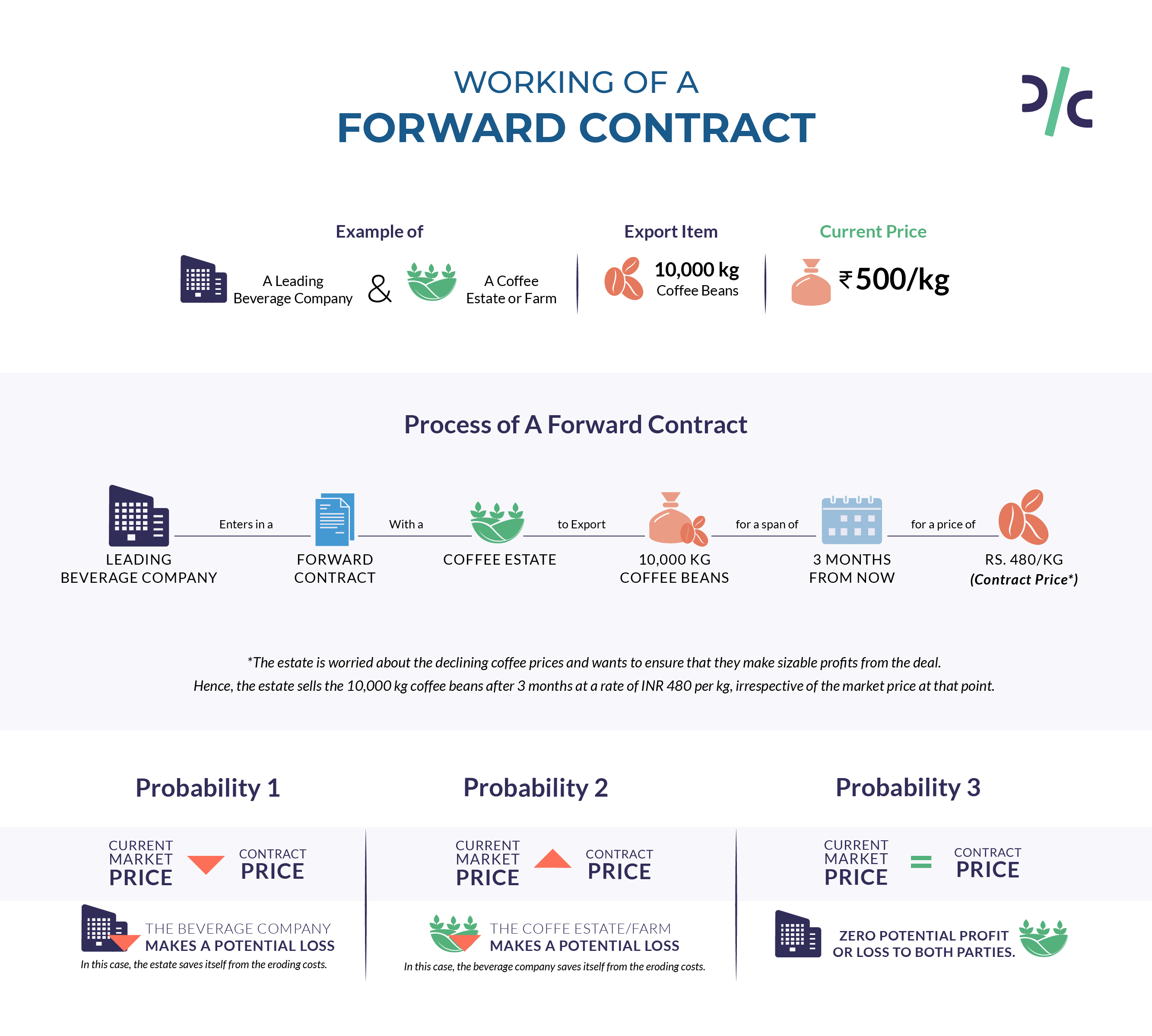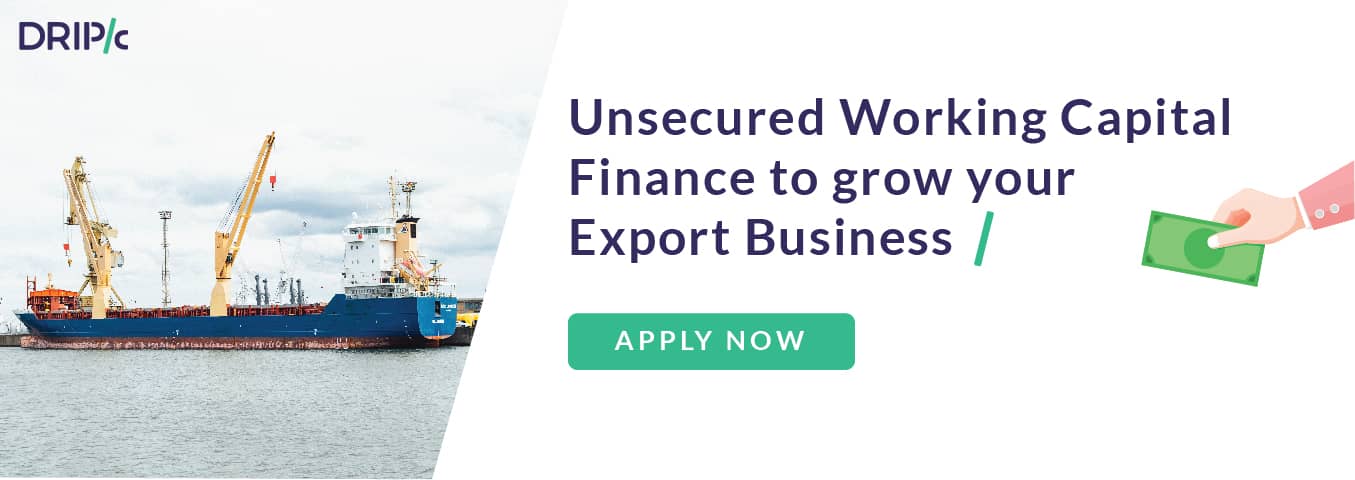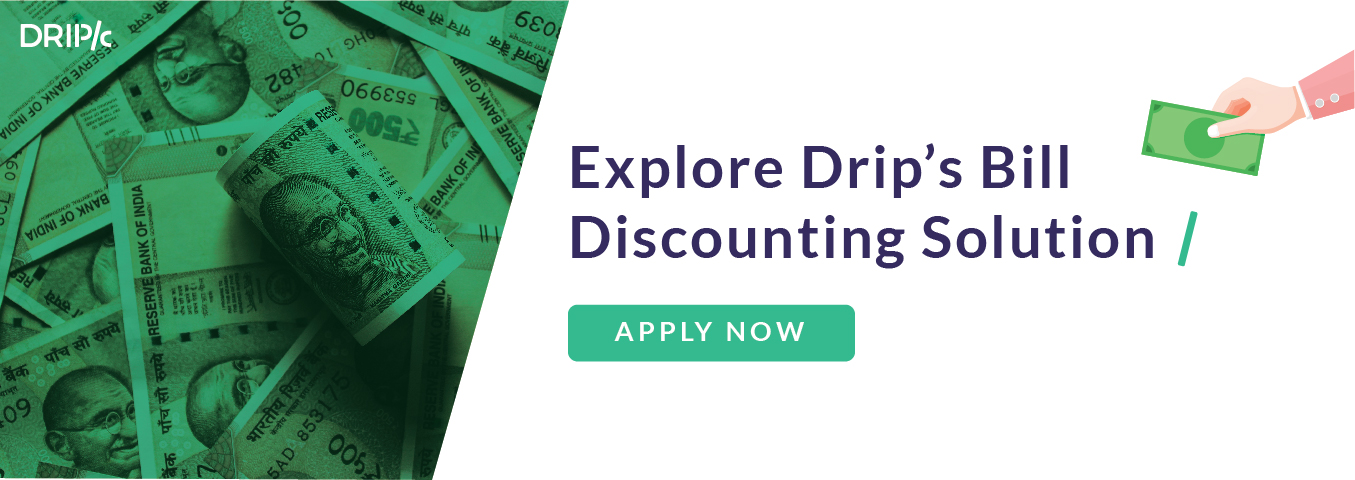All commodities, be it crude oil or even food grains, go through a price fluctuation. The price of a barrel of Crude Oil may juggle between being $50 Today and rising to $65 next month or maybe drop down to $30 a month after. These fluctuations often cause plenty of uncertainties for the businesses that depend on these commodities.
Apart from uncertainties, such fluctuations in the prices induce a lot of speculations. Companies that trade such commodities would want to leverage the dynamic prices and often use a type of financial derivative called “Forward Contracts” to buy or sell them.
What is a Forward Contract?
A forward contract is a financial derivative that is customized between two parties, wherein a commodity is bought or sold at a predetermined price but on a future date. These contracts are not standardized or regulated by any third-party authority and are considered a type of over the counter (OTC) deal between the two parties.
Forward contracts are an excellent tool for hedging your investments. They can also be used for speculations, but that option is less popular due to their non-standardized, non-regulated nature.
What are forward contracts used for?
- Using forward contracts for a rolling hedge
- Using open forward contracts, or flexible forward contracts
- Using forward contracts with market orders
Features of a Forward Contract
The following are features of any forward contract between two parties:
- A forward contract does not trade on any centralized exchange. It is also not regulated by a third-party authority.
- Forward contracts are bilateral hence are prone to counterparty risks.
- A forward contract is a tailor-made contract, with the terms and conditions that both the parties agree.
- It contains details like the expiration date, asset type, and quantity, etc.
- Generally, the general public is not aware of the price of a futures contract.
- The contract price is not available in the public domain.
What is a currency forward contract?
A currency forward deal works in the same way as any other forward deal, except that instead of a commodity, the currency is traded on a future date, on a foreign exchange market. The exchange rate is locked at the time of signing the contract, and hence, market fluctuations don't have an impact on it. Unlike other derivatives like the exchange-traded currency futures, parties can customize a currency forward contract to suit their needs.
Example: A company X in the UK imports oil worth 1 million Euros from company Y in the USA. As per their deal, company X has to pay the amount within 90 days of delivery. Let us assume that the current exchange rate is 1 Euro equals 1.2 USD. So the exporter Y in the USA expects USD 1.2 million within the 90 days of delivery.
However, the currency exchange rates are volatile and may increase or decrease in the next 90 days. The exporter wants to insulate himself from such risks, hence enters into a currency forward deal with a bank. The bank offers an exchange rate of 1.19 on the 90th day, which is slightly less than the current rate. The company Y receives 1 million Euro on the 90th day from company X and deposits it to the bank. The bank applies the locked exchange rate of 1.19 and gives them $1.19 million, irrespective of the current exchange rate. If the rate tips below the locked limit, the bank suffers a loss, and the exporter successfully evades it. If the rate goes above the locked limit, the exporter misses out on the opportunity while banks book a profit.
How does an FX Forward Contract work?
A foreign exchange (FX) forward contract is a contract between two parties where they mutually agree to exchange two designated currencies at a future date. These contracts are used for hedging and speculating on currency exchange rates. The exchange rates are locked in advance, which saves both parties from the unpredictability of the global currency spot rates.
Example of how a Forward Contract works

A leading beverage company enters into a contract with a coffee estate for exporting 10,000 kg coffee beans three months from now. The current price of coffee beans is INR 500/Kg. However, the estate is concerned about the declining coffee prices and wants to ensure that they make sizable profits from the deal. Hence, the estate enters into a forward contract with the beverage company to sell the 10,000 kg coffee beans after three months at a rate of INR 480 per kg, irrespective of the market price at that point.
After three months, the beverage company will procure the same amount of coffee beans from the estate at an agreed price as per the forward contract.
There are three possibilities:
If the current market price is less than the contract price, the beverage company makes a potential loss, in that had it not entered into a forward contract, it could have procured the same amount at the market price. In this case, the estate saves itself from the eroding costs.
If the market price is greater than the contract price, it’s the estate that makes a potential loss since they could have sold the beans at an increased rate had they not entered into the hedge contract.
The market price is the same as the contract price. In that case, there is zero potential profit or loss to both parties.
Hedging vs Speculation in Forward Contracts
The speculation involves trying to make a profit from a security's price change, whereas hedging attempts to reduce the amount of risk, or volatility, associated with a security's price change.
Speculation refers to the process of figuring out which way the markets will move in the future and taking positions on various assets and stocks depending on those projections. It is highly risky and is akin to gambling. Speculation is done by those who claim to read the markets very well.
Hedging, on the other hand, is done by companies to reduce their risk exposure due to the fluctuations in the commodity prices. During hedging, companies and investors take offsetting positions opposite to their current holdings so that the net comes as close to zero as possible.
How a Forward Contract can be used for hedging in exports?
During exports, there is a significant time gap between the signing of a deal and payment. During this gap, the value of the respective currencies is likely to fluctuate a lot in either direction. Both the parties may find themselves in a fix at the time of payment due to these changes in the exchange rates.
To hedge this risk, the parties enter into a forward contract drafted by the exporter’s financial institution. By locking in the exchange rate in advance, both the parties mitigate the risks associated with volatility and fluctuations in the exchange rates between the currencies.
How do you value or price a forward contract?
The price of a forward contract, which is often known as the forward rate, is obtained by adding /subtracting the forward points to/from the spot rate. Forward points are calculated based on the difference in the interest rates of the two currencies that are to be traded.
A forward point is 1/10,000 or 0.0001 of the spot rate.
Types of Forward Contracts
Closed Outright Forward
This is the simplest type of a forward contract, where both parties agree to exchange currencies at a future date by locking in an exchange price. These are also known as European contracts or Standard Forward Contracts.
Flexible Forward
With flexible forwards, the parties can exchange the funds before the settlement date, often in parts, as long as the entire amount is settled by the due date.
Long-Dated Forward
These have the same functionality as any forward contract, except that the settlement period often extends over more than a year. Generally, most forward contracts are short term contracts, which is what differentiates the long date forward contracts from the rest of them,
Non-Deliverable Forward
Usually, parties enter into forward contracts over a physical exchange of a commodity, an asset, or currency. However, with non-deliverable forwards, the parties only exchange the difference between the contract rate and the spot rate at the time of maturity.
Advantages of a Forward Contract
The following are the advantages of a forward contract:
- Highly customized.
- Great way to hedge against the fluctuations of the market.
- Lowers international trade-related risks.
- No upfront costs for hedging.
Risks or Limitations of a Forward Contract
Very little public information about the market cap due to lack of regularization.
Prone to counterparty risks such as non-payment due to defaults.
In a highly volatile market, forward contracts may hurt a company that miscalculated the movement of the prices.
What is the difference between a Forward Contract and a Futures Contract?
Both- forward contracts and futures contracts are financial derivatives and are types of agreements between parties to buy or sell a commodity at a future date. However, they still differ from one another slightly. Futures contracts trade on an exchange and are standardized, while forward contracts are non-regulated agreements that do not trade on any exchange.
Parties cannot customize future contracts. However, forward contracts can be customized and tailor-made as they are an over the table deal.
What is the difference between a Forward Contract and a Spot Contract?
A spot price refers to the current price at which an asset or a commodity is available in the market. When a company wants to procure any asset or a commodity immediately, they buy it at its spot price and take the delivery instantly. Such a deal is known as a spot contract.
However, if a company needs an asset or a commodity six months later, but is skeptical about its prices skyrocketing by then, they decide to buy it at its current price but after six months. Such a deal is known as a forward contract.
Can Forward Contracts be canceled?
Either of the parties can cancel the contract. The canceling party has to pay the difference between the contract rate and the spot rate of the commodity.
Are Forward Contracts Regulated?
No, forward contracts are neither regulated nor standardized. They are customized contracts between two parties and considered over the counter (OTC) deals.
Also Read




